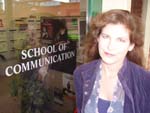Some recommendations in the report of the Independent Media Inquiry into the Australian media have found support from two Charles Sturt University (CSU) journalism academics, particularly regarding regional media.
 Ms Margaret Van Heekeren, a journalism lecturer at the CSU School of Communication and Creative Industries in Bathurst has welcomed the recommendation for an urgent government investigation into regional media.
Ms Margaret Van Heekeren, a journalism lecturer at the CSU School of Communication and Creative Industries in Bathurst has welcomed the recommendation for an urgent government investigation into regional media.The Australian government established an independent inquiry into the Australian media in September 2011 to be led by former Justice of the Federal Court of Australia, Mr Ray Finkelstein, QC. The inquiry reported to government on 28 February 2012.
The inquiry found that local news services had suffered as a result of cutbacks to the print, radio and television media, and the report suggests that some form of government support may be needed.
Ms Van Heekeren, a former news editor with WIN Television, said, “The report finally brought into the decision making arena something that regional residents have known for several years; syndication and networking by the broadcast services, in particular, has led to a decrease in local content, and, most importantly, local news.”
Ms Van Heekeren said the main recommendation of the report, the establishment of a government appointed News Media Council, was a controversial step.
“However, while the quality of journalism is manifestly important on a national scale, it means little to the daily lives of many regional residents who have no, or very little, local journalism in the first place,” she said.
 Another CSU journalism lecturer, Ms Kay Nankervis, also welcomed the report’s urgent call for further investigation of the adequacy of news services in regional areas, and said, “The picture painted by the Finkelstein report of financial pressures on Australian media shows that we need the Australian Broadcasting Corporation (ABC) more than ever.
Another CSU journalism lecturer, Ms Kay Nankervis, also welcomed the report’s urgent call for further investigation of the adequacy of news services in regional areas, and said, “The picture painted by the Finkelstein report of financial pressures on Australian media shows that we need the Australian Broadcasting Corporation (ABC) more than ever.“The report acknowledges the important role that journalism plays in supporting democracy by calling to account the actions of governments and those in financial power, and it praises the ABC’s role in performing this function in Australia,” Ms Nankervis said.
“Increasingly, television news services that are broadcast from regional centres are being forced by the prohibitive cost of upgrading regional facilities to new digital formats to shift to central production in capital cities. As radio advertising revenues fall under the pressure of the internet, national and state networking has overtaken much of the content on regional radio stations.”
Ms Nankervis, who has worked as a journalist for the ABC, SBS, and Britain’s Independent Radio News, says the role of the ABC therefore remains important as a constant source of local information in the regions. She notes that the ABC has maintained local programming on its regional radio networks and has developed its online platform to include local news, information and interaction for regional audiences.
“I think what is left unsaid in Mr Finkelstein’s key recommendations is the extent to which the ABC has withstood, better than any other ‘traditional’ Australian news service, the impact of the internet and digital technology developments on revenue which has historically supported journalism.”
Ms Nankervis said the report’s recommendation of an all encompassing news media watchdog - a News Media Council - that will set journalistic standards and field complaints, with power to require media outlets to publish apologies, corrections and retractions, and afford individuals the right of reply, will need to be the subject of much debate. She says ensuring such a Council’s independence, when it will rely on government funding for its existence, will be especially difficult.
“The ABC has operated under its own charter, recently updated for the digital and internet era, and many commentators are arguing that it should be left out of the News Media Council’s operations,” Ms Nankervis said. “At the very least, the national broadcaster should have special status with the News Media Council, enabling it to continue to deal with complaints and set standards in accordance with its charter, as it has always done.





Social
Explore the world of social